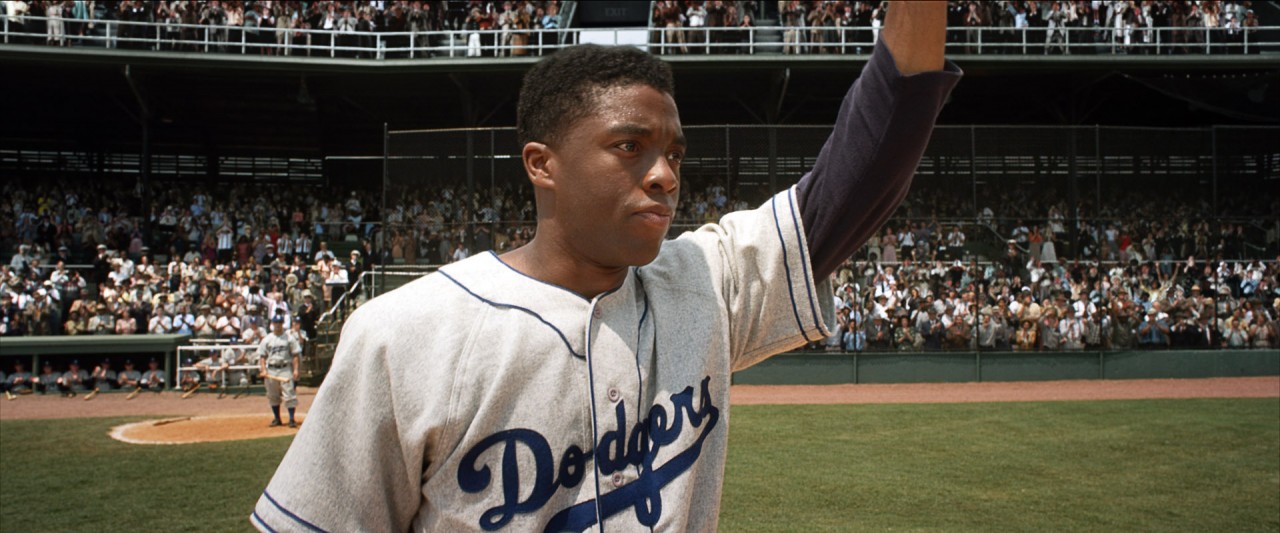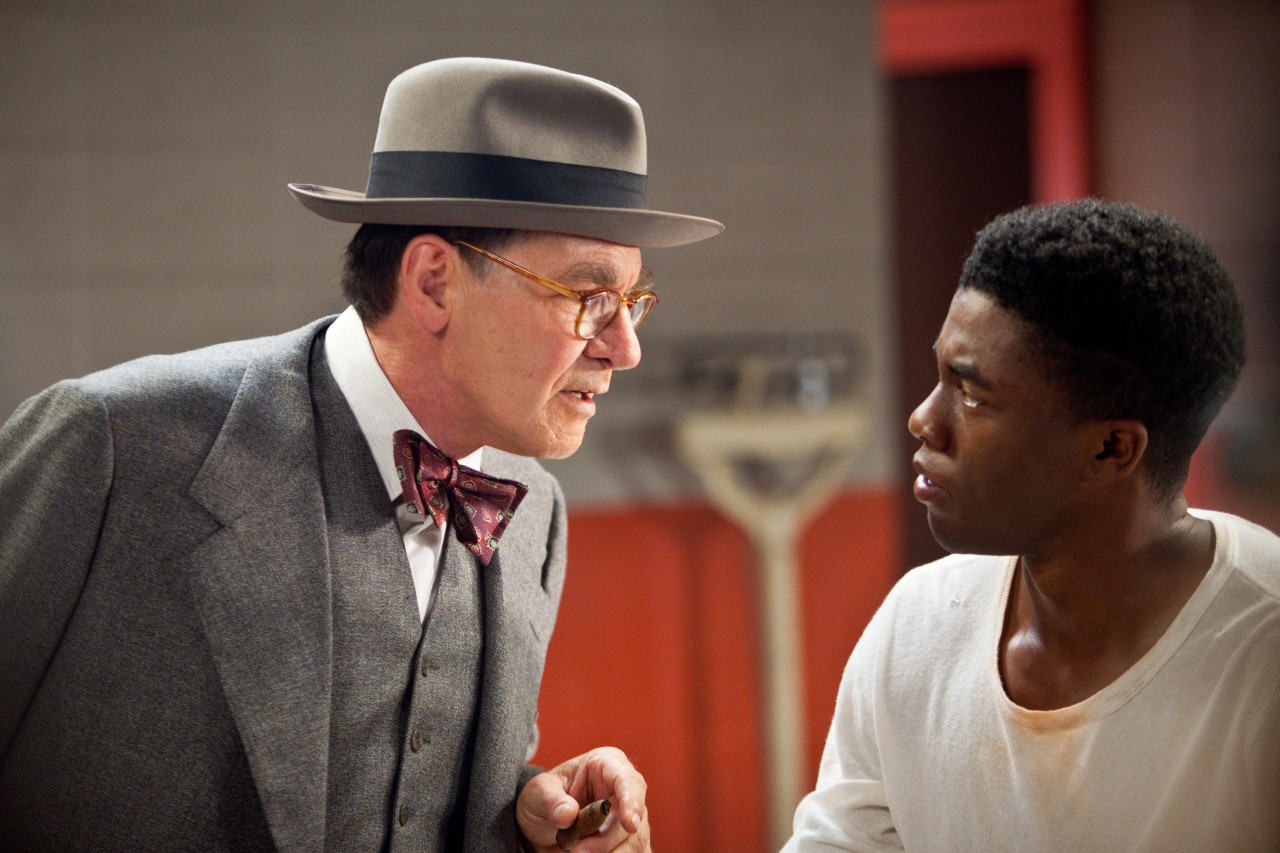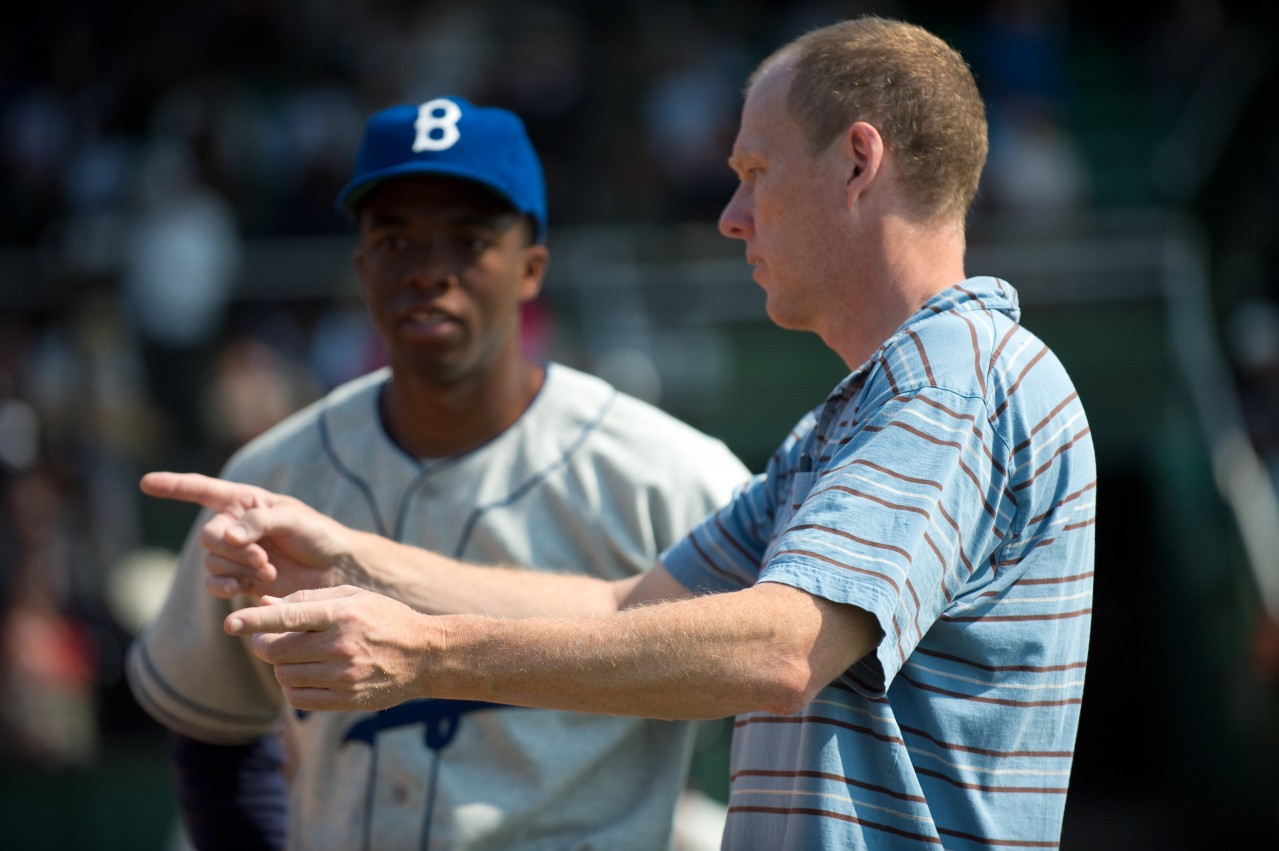There’s no crying in baseball…until ‘42′
May 7, 2013 by Tom Ferda
Published in Film Trailers Magazine May, 2013
We all know there’s no crying in baseball but it’s hard not to do when watching ‘42’, the Jackie Robinson story. The film portrays the adversities and racial tryst baseball’s first African-American player faced when he broke barriers to play in the all-white professional league.
On April 15, 1947, Jackie Robinson emerged from the tunnel at Ebbets Field in a Brooklyn Dodgers’ uniform bearing the number 42. It wasthat very instant he broke Major League Baseball’s infamous color line.
Brian Helgeland, the writer and director of “42,” revealed that he, like most other people, was unaware of the level of opposition and blatant bigotry Robinson faced as the first black to play for any major league team.
“I thought I knew a lot about Jackie Robinson, but when I began researching the story, I realized I knew very little about that time and what he actually went through,” said Helgeland. “I wanted to make a film that was entertaining but also one that shows what a big breakthrough it was then and how it still resonates today.”

Photo: Courtesy of Warner Bros.
So how did ‘42’ come to fruition?
Producer Thomas Tull saw an opportunity to bring the inspirational story to film audiences when he was introduced to Jackie’s wife, Rachel Robinson, who entrusted him with the project. Tull contacted Helgeland who happened to be in Brooklyn at the time. They took that coincidence as a sign and both committed to the project.
“I went to the Baseball Hall of Fame when I was seven years old, which is when I first learned about Jackie Robinson, and his story stayed with me,” said Tull. “It really is a classic hero’s journey, someone who has unbelievable odds stacked against him and has the fortitude to overcome those odds. When he broke the color line, it marked a turning point, not only in baseball but in history.”
Chadwick Boseman played the baseball legend and although the actor bears a resemblance to the real Robinson, Helgeland said he was more impressed by what the actor conveyed from within. “You can see [Boseman] reacting even when he’s being quiet. You know how things are hitting him just looking at his face. As far as the part of Jackie Robinson was concerned, I just felt I would know him when he walked in the door. And that’s exactly what happened.”
Boseman also played the role of Floyd Little in the film “The Express” that portrayed the first African American to win the Heisman Trophy.
“Once you know the full scope of what [Robinson] did, on the baseball field and in his later work in the Civil Rights movement, you realize that his contribution to society was tremendous, and not just in the sports world,” Boseman said. “He paved the way for people in every field, so I feel a personal connection to him because I am standing on his shoulders right now.”

Photo: D. Stevens
This major turn in history would never have happened back then if it weren’t for 65-year-old Brooklyn Dodgers President and General Manager Branch Rickey, a Caucasian man who was on a mission. In the racial climate of 1940s America, it arguably took as much courage for Rickey to open the door to integrating Major League Baseball as it did to be the man who walked through it. Rickey spent time dodging death threats and stern warnings from opposing owners and his commissioner.
Despite vehement opposition from the league, the public and his own players, Rickey signed Robinson to his team. Screen vet Harrison Ford portrayed the visionary baseball exec.
“Branch Rickey is a great, forgotten, figure,” says Helgeland. “Historians and those in baseball know who he was, but the average person has no idea. He’d given his life to the game and thought very deeply about how to improve it. He could have just rested on his laurels but bravely decided to put it all on the line and integrate baseball.”

Photo: D. Stevens
Helgeland knew that it would be impossible to do justice to the entire Jackie Robinson story in a single film. Therefore, he decided to focus on the pivotal years of 1945 through `47, during which time, Helgeland details, “he got married, signed with the Dodgers’ minor league affiliate, the Montreal Royals, and then made his major league debut.”
Rachel Robinson who has kept her husband’s legacy alive for decades through the Jackie Robinson Foundation was a vital resource and served as a consultant.
“What I believed then, and still do, is that the challenges made us feel like it was the two of us against the world,” said Rachel Robinson. “We knew this was an experiment in social change that had to succeed. We were fortunate to love each other so deeply that we could carry that belief forward, and I’m delighted that Brian captured all that in the script.”
And for fact’s sake, Robinson won the Rookie of the Year award in 1947, three years later hit a league-best .342 to win MVP and most notably won the hearts of baseball fans across America.
While No. 42 is universally retired throughout MLB, once per season Jackie Robinson Day is celebrated and every player in the league wears his number to honor his historic trek.
Contact Tom via email: tom@tomferda.com
